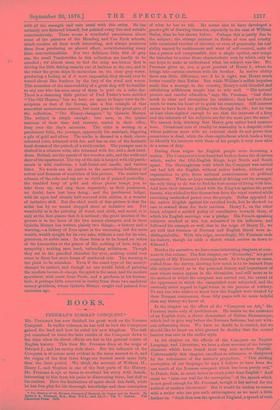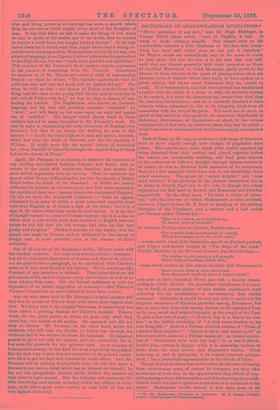BOOKS.
FREEMAN'S NORMAN CONQUEST.*
Mn. FREEMAN has now finished his great work on the Norman Conquest. In earlier volumes, he has told us how the Conqueror gained the land and how he ruled his new kingdom. The task yet remained to trace the later results of the Conquest down to the time when its direct effects are lost in the general course of English history. This time Mr. Freeman fixes at the reign of Edward I., and his survey ends there. But the influence of the Conquest is of course most evident in the times nearest to it, and the reigns of the first three kings are treated much more fully than the later period. We think the aceount of William IL, Henry I., and Stephen is one of the best parts of the History. Mr. Freeman is apt at times to overload his story with details, interesting to him from his pains in discovering them, but dull to his readers. Here the limitations of space cheek this fault, while he has free play for his thorough knowledge and clear conception wralare Ellstopilveof the Nornuin Conquest of England; its Camila and us Resuica By Eds d Hon. D.O.L., end LL.D.: Vol V. Oxford: The with a writer who can pen such extravagance as we meet a little- Clarendon Prem. 1116.74.1"' farther on. "Such then was the speech of England, a speech of such of what he has to tell. He seems also to have developed a greater gift of drawing character, especially in the case of William Rufus, than he has shown before. Perhaps this is partly due to the subject ; the strange mixture in Rufus of vice and cruelty with occasional touches of chivalry, or even of generosity, his real ability marred by recklessness and want of self-control, make of him a person not compressible into a single epithet, and tempt the historian to notice those characteristic acts by which only he
can hope to make us understand what his subject was like. Mr. Freeman gives us, too, a good portrait of Henry I., whom he brings into curious contrast with his brother. in native ability there was little difference, nor, if he is right, was Henry muck better morally than Rufus. But while William's selfish impulses made him a scourge to the country, Henry's cold-blooded and calculating selfishness taught him to rule well. "His natural powers and careful education," says Mr. Freeman, "had done much to clear and strengthen his intellect ; they had not done much to warm his heart or to guide his conscience. Self-interest seems to have been his guiding rule through his life ; but he was at least clear-sighted enough to see that the interests of a king and the interests of his subjects are for the most part the same."
We cannot help thinking that Henry gets rather hard measure here. Occasional acts of cruelty or sensuality in a despotic ruler whose passions meet with no external check do not prove that conscience is dead, while the clear-sightedness which leads a king to identify his interests with those of his people is very near akin to a sense of duty.
During these reigns the English people were becoming a nation. The Conqueror's iron hand had broken down the divisions which, under the Old-English Kings, kept North and South apart. The thoroughness with which the Conquest was carried out had left the English without native leaders, without any organisation to give them national consciousness or political aspirations. When no hope remained of driving out the stranger, the only thing to do was to find the best means of living with him.
And here their interest joined with the King's as against the great barons, who wished to free themselves from the royal control while exercising unchecked power over the people. Rufus appealed to the native English against his revolted lords, but he showed no care to reward them for their services. Henry I., on the other hand, adopted a settled policy of conciliation towards them, of which his English marriage was a pledge. His French-speaking subjects mocked at him but submitted to his influence, and followed his example so well, that in the reign of Henry II., we
are told that freemen of Norman and English blood were in- distinguishable. With this reign, accordingly, Mr. Freeman ends his history, though he adds a sketch which carries us down to Edward I.
Besides the narrative, we have some interesting chapters of com- ment in this volume. The first chapter, on "Domesday," is a good example of Mr. Freeman's thorough work. In it he gives us cases, culled from the survey, showing how much is to be learned from this unique record as to the personal history and importance of
men whose names appear in the chronicles, and still more as to the method in which the conquest was carried out, the extent of the oppression to which the vanquished were subjected, and the curiously strict regard to legal forms in the process of robbery. To any one who wishes to know how the English were treated by their Norman conquerors, these fifty pages will be more helpful than any history we know of.
In the chapter on the effect of the "Conquest on Art," Mr. Freeman treats only of Architecture. He insists on the existence of an English style, a direct descendant of Italian Romanesque, which had to give way before the Norman fashions, but not with- out influencing them. We have no doubt he is correct, but we should like to know on what ground he decides that the central lantern was rare in the earlier style.
In his chapter on the effects of the Conquest on English Language and Literature, we have a clear account of the foreign elements which have found their way into modern English.
Unfortunately this chapter, excellent in substance, is disfigured by the vehemence of the author's prejudices. "This abiding corruption of our language, he says, I believe to have been the one result of the N orman conquest which has been purely evil." Is Dutch, then, so much better in every point than English ? And
must we "raise our wail for the corruption" of the speech which is not good enough for Mr. Freeman, though it has served for the noblest of modern literatures? But it would be useless to reason.
Eds d Hon. D.O.L., end LL.D.: Vol V. Oxford: The with a writer who can pen such extravagance as we meet a little- Clarendon Prem. 1116.74.1"' farther on. "Such then was the speech of England, a speech of such true and living power as no later age has seen, a speech which from its own stores could supply every need of the thoughts of man. It was only when we had to name the things of evil, when we bad to speak of the castles and of the devils, that we needed to borrow a word from any tongue beyond the sea." In its high moral character it would seem that Anglo-Saxon had a strong re- semblance to the tongue of the Houyhnhnrns, which, by the way, was a kindred language, since Captain Gulliver tells us that it approached to the High Dutch, but was "much more graceful and significant." This crotchet of Mr. Freeman's finds another curious expression in his manner of translating from the Chronicle. Sometimes he reminds us of Mr. Thackeray's comical trick of representing French ; as when he writes, "The traitors understood that he mild man was and soft and good, and no justice did not." But when he tells us that "the Queen of France todealed from the King, and she came to the young Earl Henry, and he took her to wife and all Poitou with her," we fear he runs a chance of mis- leading his readers. The Englishman who knows no Teutonic language but his own will probably translate " todealed" by "went," and will fancy he has come upon an early and quaint use of "toddled." The temper which shows itself in these oddities has led to many blemishes in Mr. Freeman's work. He may be right in maintaining the early suzerainty of England over Scotland, but that is no reason for trailing his coat in this fashion :—" As for the rebel highest in rank and power, Alnwick, which had seen the death of Malcolm, saw also the captivity of William. It might seem like the special victory of embodied law, when Randolf of Glanville brought the captive King of Scots before the throne of Henry."
Again, Mr. Freeman is so anxious to disprove the existence of any abiding race-hatred between Norman and Saxon, that he recura to the point with wearisome iteration, and presses the most trivial arguments into his service. Thus he mentions the speech which Henry of Huntingdon put into the mouth of Bishop Ralph before the battle of the Standard ; in which the bishop addresses his hearers as Normannigenw, and bids them remember the exploits of their race; among others, the conquest of England. On this we have the wonderful comment :—" Such an appeal, addressed to an army of which a great numerical majority must have been English, is of course a sign of the times; but it is a sign of the times which may easily be read wrong. It is the line of thought natural to a man of Norman descent ; but it is a line on which such a man would never have ventured to English hearers, unless he had felt that the old wrongs had been by that time pretty well forgiven." Thierry's account of the matter, that the speech was made in French, and so addressed to the barons of foreign race, is more probable, even in the absence of direct authority.
But of all objects of Mr. Freeman's dislike, Thierry meets with the hardest measure. Not only is his history called a " romance," but all the historical absurdities of Ivanhoe and Harold the Daunt- less are packed into a paragraph, to be associated with Thierry's name as if they were found in his history. We do not accuse Mr. Freeman of any intention to mislead. These absurdities are old grievances of his, and he expects every one to know as well as he does whence they come. But the formal unfairness is only the expression of an unfair suggestion of contempt,—that Thierry's Norman Conquest has no more historical value than Ivanhoe.
Any one who turns back to Mr. Freeman's original preface will End that he speaks of Thierry there with much more respect than now. We fancy that to the original bitterness of controversy has been added a growing distaste for Thierry's Method. Thierry wrote for the great public, to whom he gave only what they -cared for,—the results of his studies. He narrated, and did not
stop to discuss. Mr. Freeman, on the other hand, writes for students, who will take the trouble to follow him through his
evidence and to see whence he draws his materials. On disputed points he gives not only his opinion, and the authorities for it, but even the grounds for the opposite view. As an example of fullness and accuracy in this kind the book is probably unequalled.
But for that very reason it is not attractive to the general reader, who likes to get his facts and conclusions ready sifted. And Mr.
Freeman will do nothing to propitiate him ; he will not spare a
discussion nor omit a detail which has an interest for himself ; he has not the sympathetic instinct which teaches the masters of style what to leave unsaid. But the industry and acuteness, the wide knowledge and minute accuracy which are evident in every page, make this a great work, worthy to rank with all but the very highest of its kind.



































 Previous page
Previous page